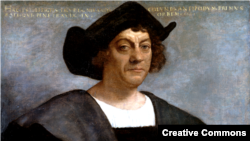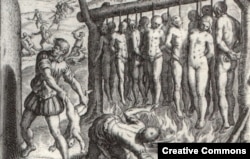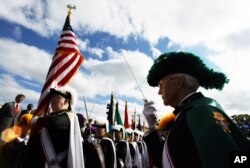“In fourteen-hundred-ninety-two, Columbus sailed the ocean blue…” Generations of American schoolchildren have chanted this poem to celebrate the second Monday in October, Columbus Day, a U.S. federal holiday celebrating the “discovery” of America by 15th Century explorer Christopher Columbus.
But the day has long aroused the sadness and ire of Native Americans, who say it overlooks the wholesale slaughter and exploitation of the indigenous peoples of the Western hemisphere by Spanish fortune seekers.
Over the centuries, Columbus has achieved mythic status, but many of the most enduring stories about the explorer are false. Historians have demonstrated he was likely from northeastern Spain, not Italy. He is said to be the man who proved to Europe that the earth was round, not flat. As it turns out, the shape of the earth was found centuries earlier by Greeks, Romans and Arabs, something educated Europeans already knew.
And the most enduring myth of all is that Columbus discovered America, a continent inhabited by peoples who had migrated thousands of years earlier. Nor was he the first European to sail to North America; Norse explorer Leif Erikson likely stepped onto the continent almost 500 years before.
“It is worth noting that Columbus didn’t land on the higher 48 states, ever,” said Mohawk journalist and author Vincent Schilling in an emailed statement. “Columbus quite literally landed in what is now known as the Bahamas and later Hispaniola, present-day Haiti and the Dominican Republic.”
Schilling dismisses Columbus as a “murderer, rapist and pedophile,” based on accounts by Columbus and contemporary witnesses.
“Columbus and his men murdered Natives for gold, by cutting off their hands if they did not find gold in the mines, sought out nine-year-old native girls for his men and fed babies to dogs of war,” said Schilling. “He returned to Spain in shackles and yet was pardoned.”
Today, a growing number of cities across the United States have moved to repeal Columbus Day and replace it with a holiday honoring indigenous and native people. The largest, so far, is Los Angeles, California, which in August voted to “dismantle a state-sponsored celebration of genocide of indigenous peoples.”
Several states have also rejected Columbus Day, replacing it with celebrations of “Native American Day,” “American Indian Day” or “Indigenous People’s Day,” which Native American activists first pitched at a 1977 International Conference on Discrimination Against Indigenous Populations in the Americas, sponsored by the United Nations in Geneva.
In the 40 years since, the movement has gained traction, but it is not without controversy.
"Christopher Columbus was not a saint,” said Justin Haskins, a fellow at the Heartland Institute, a conservative Chicago-based research organization.
“He engaged in some truly horrific acts during his multiple journeys to the New World. But it's undeniable that his endeavors forever changed Western civilization and led to the establishment of permanent European colonies in the North, Central, and South Americas - colonies that eventually became some of the most influential and powerful nations in the world” and impacted the cause of democracy around the world.
"If the only people we choose to remember are those who lived perfect lives, there won't be anyone left to honor,” he said, echoing sentiments expressed during recent protests over the toppling of confederate statues in the city of Charlottesville, Virginia and elsewhere.
Many Italian Americans are also reluctant to see the holiday go. Their ancestors, most of whom emigrated to America in the late 19th and early 20th Centuries, faced widespread discrimination and exploitation and seized the stature of Columbus as a powerful symbol of Italian-American heritage.
“Columbus was an explorer, a renowned sailor, and later governor who certainly partook in actions over the course of his career that were deemed unjust,” Columbus Citizens Foundation President Angelo Vivolo said in a recent statement. “The Foundation believes that these actions and their long-term consequences deserve serious reflection and acknowledgement, but we cannot and will not deny the role this seafarer from Genoa had in the eventual shaping of the United States of America.”
The Knights of Columbus, a Catholic fraternal organization that pressured the government into adopting the holiday in the first place, says Columbus has been “slandered and unfairly blamed for everything that occurred after he arrived on this continent,” calling him “a man ahead of his time.”













